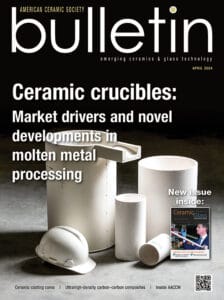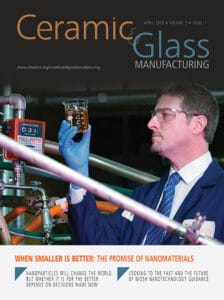The UK Chapter of The American Ceramic Society and the University of Sheffield co-organized a workshop on “Sustainable Manufacturing of Advanced Ceramics” held at the Materials Science & Engineering department of the University of Sheffield the September 12, 2017. This is the second event for the UK Chapter since its formation in October 2016. This workshop was well-attended with approximately 60 participants. It was remarkable that more than 50% of the attendees came from out of Sheffield (35), from either academia or industry. Universities from different UK locations were represented, such as Manchester, Liverpool, Sheffield, Leeds, Loughborough, Birmingham, Oxford, Surrey, University College of London, Queen Mary University of London and Imperial College London. Also, there was an increased attendance from companies staff compared to our first meeting and 30% of the attendees (18) were coming from industry and 10 different companies were represented, such as Johnson Matthey, Morgan Advanced Materials, Lucideon, Precision Ceramics Ltd, Heraus Electro-Nite UK, Precision Ceramics Ltd., NovaMat Limited, Washington Mills Electro Minerals Ltd., Thales UK, Deregallera Ltd. and Refracto-Ceramics Consultancy Ltd. This clearly shows increased interest from companies for UK Chapter events as the number of attendees coming from industry has nearly doubled compared to the first event. It was specially remarkable that one of the companies (Heraus Electro-Nite UK) sent a group of students from its graduate program to the workshop and submitted feedback after the workshop, which was described by the company representative as a “glowing report”. As in the first meeting, there was a good balance and mix of experienced researchers, industry people, early-career researchers and students, with a strong presence of early career students from the Sheffield University.
The success of the workshop relied on the strong attendance and interaction during the workshop. There was a growing interest for UK Chapter activities as nearly everyone asked about future events, future directions of the UK Chapter and provided suggestions about how things could be improved for the sake of the UK ceramic community. The UK Chapter is pleased with the increasing interest from the community and strong involvement of industry and will try to promote events to increase this interaction and create a stronger bond between early career researchers and industrialists.
This success would have not been possible without the kind participation and contribution from our plenary speakers, who are first-class, worldwide-known researchers in the field of ceramics manufacturing, who enlightened the audience with superb presentations and latest developments on the field. Topics discussed during the workshop covered different aspects of ceramics manufacturing, from how a material discovery in a lab could be implemented at industry level (Prof. Jawwad Darr), or a complete view of rheology of ceramic suspensions with a scientific explanation of why the ketchup splashes when stirred vigorously (Dr. Esther Garcia-Tunon), or an evolution of 3D printing to latest advances, including an example about how Lord Kelvin made more money helping to develop the telegraphs than with the second law of thermodynamics (Prof. Brian Derby), or how an electric current could be used to sinter ceramics and challenges involved to scale up (Prof. Mike Reece), or how a classic explanation could be more effective to explain a novel process called “flash sintering” (Prof. Richard Todd), or how microwaves could be used to sinter ceramics and also to include smart ceramic sensors or reinforcements in next generation of traineers (Prof. Bala Vaidhyanathan), to how a new route could be developed for the recently discovered “cold sintering” (Dr. Rebecca Boston). It could be concluded that the audience enjoyed the workshop and are looking forward to next UK Chapter events and activities.
The target of the UK Chapter for its second year of existence is to try to increase the involvement of early career researchers with our events as they represent the future of our community and some activities will be announced soon, including the 1st UK Chapter workshop completely led by early career researchers.
At last but not least, the UK Chapter would like to acknowledge Prof. Ian Reaney from the University of Sheffield for the support and help provided to organize a successful workshop.
Subscribe to Ceramic Tech Today

Don’t miss the latest ceramic and glass materials news. Receive the CTT newsletter to your email three times a week by subscribing at this link.
Subscribe to Ceramic & Glass Manufacturing Weekly

Don’t miss the latest ceramic and glass business news. Receive the C&GM Weekly newsletter to your email every Monday by subscribing at this link.


